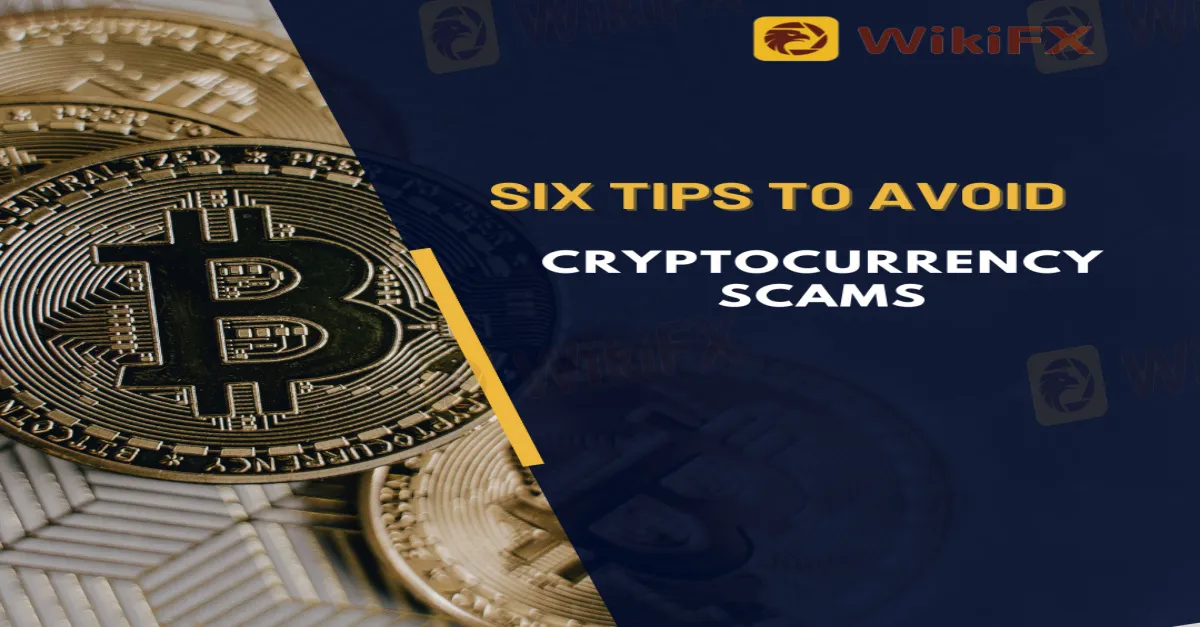简体中文
繁體中文
English
Pусский
日本語
ภาษาไทย
Tiếng Việt
Bahasa Indonesia
Español
हिन्दी
Filippiiniläinen
Français
Deutsch
Português
Türkçe
한국어
العربية
Six Tips to avoid cryptocurrency scams
Abstract:Cryptocurrency scams are becoming increasingly common, which is why it's important to know how to protect yourself. Here are six tips that can help you avoid falling victim to these scams.

Cryptocurrency scams are becoming increasingly common, which is why it's important to know how to protect yourself. Here are six tips that can help you avoid falling victim to these scams.
Beware of Phishing websites:

Be cautious of emails or messages that ask for your personal information or login credentials. Always double-check the sender's email address or phone number before responding.
Some can be extremely close to the real deal, so ensure that you always check that you are on the authentic wallet website before downloading and installing any extension or logging in with your credentials.
Verify the Messages' Authenticity:
These have been various internet frauds in which you are contacted by the “support team” for a specific project or the “promotional team” for a specific NFT collection. They would tell you that your wallet “has been compromised” and that you must provide them information in order for it to be recovered.
At all costs, avoid these types of scams. Even if you believe the influencer, always double-check who messaged you, when the account was formed, when the URL was registered, and if there is a legitimate company behind the communications.
Keep Your Private Keys to Yourself:

An authentic wallet provider will never request your 12-word seed phrase if you use a wallet where you own the private keys.You should never let anyone else see this; it should only be for your eyes.
Nobody can compromise your wallet using your public key, but if someone learns your password or the 12-word seed phrase, your cryptocurrency will be lost forever.
Use a secure wallet:

It is highly recommended to use a secure wallet to protect yourself from cryptocurrency scams. A secure wallet is a digital wallet that stores your private keys and allows you to securely send and receive cryptocurrencies. By using a secure wallet, you can ensure that your funds are safe from hackers and scammers who may attempt to steal your private keys or access your wallet. It is important to do your research and choose a reputable wallet provider that has a proven track record of security. Choose a wallet that offers two-factor authentication and encryption to keep your funds safe.
Avoid public Wi-Fi:

It's important to avoid public wifi when dealing with cryptocurrency to protect yourself from potential scams. Public wifi networks are often unsecured, making it easier for hackers to access your personal information and steal your digital assets. To ensure the safety of your cryptocurrency investments, it's best to only use secure, private internet connections.
Stay informed:
Stay informed is crucial to protecting yourself from cryptocurrency scams. With the rise of digital currencies, scammers are finding new ways to exploit unsuspecting investors. By Keep yourself updated on the latest cryptocurrency scams and news. Follow reputable sources and stay vigilant to avoid falling victim to scams. Keep an eye out for red flags such as promises of high returns with little to no risk, unsolicited investment offers, and pressure to act quickly. Remember to always do your own research and never invest more than you can afford to lose.
To know about the security and reliability of your chosen brokers, you can use Wikifx app. To expand your knowledge and stay informed about the forex market. Download the Wikifx app on your phones. Here is the Link to the download: https://www.wikifx.com/en/download.html

Disclaimer:
The views in this article only represent the author's personal views, and do not constitute investment advice on this platform. This platform does not guarantee the accuracy, completeness and timeliness of the information in the article, and will not be liable for any loss caused by the use of or reliance on the information in the article.
WikiFX Broker
Latest News
Enlighten Securities Penalized $5 Million as SFC Uncovers Risk Control Failures
Why Are Financial Firms Adopting Stablecoins to Enhance Services and Stability?
Experienced Forex Traders Usually Do This Before Making a Lot of Money
Octa vs XM:Face-Off: A Detailed Comparison
When High Returns Go Wrong: How a Finance Manager Lost RM364,000
Bridging Trust, Exploring Best—WikiEXPO Hong Kong 2025 Wraps Up Spectacularly
Fidelity Investments Explores Stablecoin Innovation in Digital Assets Sector
Interactive Brokers Expands Crypto Trading with Solana, XRP, Cardano, and Dogecoin
SEC Ends Crypto.com Probe, No Action Taken by Regulator
Why More People Are Trading Online Today?
Currency Calculator







